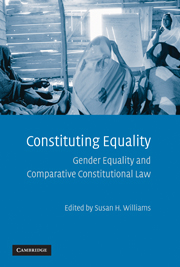Book contents
- Frontmatter
- Contents
- List of Contributors
- Acknowledgments
- CONSTITUTING EQUALITY
- Introduction: Comparative Constitutional Law, Gender Equality, and Constitutional Design
- SECTION ONE STRUCTURE
- SECTION TWO RIGHTS
- SECTION THREE CULTURE/RELIGION AND GENDER EQUALITY
- 6 Must Feminists Support Entrenchment of Sex Equality? Lessons from Quebec
- 7 Deconstructing the East/West Binary: Substantive Equality and Islamic Marriage in a Comparative Dialogue
- 8 Conflicting Agendas? Women's Rights and Customary Law in African Constitutional Reform
- 9 Gender Equality and the Rule of Law in Liberia: Statutory Law, Customary Law, and the Status of Women
- SECTION FOUR CONSTITUTIONS AND INTERNATIONAL LAW
- SECTION FIVE WOMEN IN THE PROCESS OF CONSTITUTION MAKING
- Conclusion: Gender Equality and the Idea of a Constitution: Entrenchment, Jurisdiction, and Interpretation
- Index
- References
6 - Must Feminists Support Entrenchment of Sex Equality? Lessons from Quebec
Published online by Cambridge University Press: 26 October 2009
- Frontmatter
- Contents
- List of Contributors
- Acknowledgments
- CONSTITUTING EQUALITY
- Introduction: Comparative Constitutional Law, Gender Equality, and Constitutional Design
- SECTION ONE STRUCTURE
- SECTION TWO RIGHTS
- SECTION THREE CULTURE/RELIGION AND GENDER EQUALITY
- 6 Must Feminists Support Entrenchment of Sex Equality? Lessons from Quebec
- 7 Deconstructing the East/West Binary: Substantive Equality and Islamic Marriage in a Comparative Dialogue
- 8 Conflicting Agendas? Women's Rights and Customary Law in African Constitutional Reform
- 9 Gender Equality and the Rule of Law in Liberia: Statutory Law, Customary Law, and the Status of Women
- SECTION FOUR CONSTITUTIONS AND INTERNATIONAL LAW
- SECTION FIVE WOMEN IN THE PROCESS OF CONSTITUTION MAKING
- Conclusion: Gender Equality and the Idea of a Constitution: Entrenchment, Jurisdiction, and Interpretation
- Index
- References
Summary
INTRODUCTION
Must feminists support entrenchment of sex equality? Although an affirmative response might appear self-evident, recent events in the Canadian province of Quebec might give feminists pause. The issue was not whether the province should entrench its first sex equality provision; the Quebec Charter of Human Rights and Freedoms (“Quebec Charter”) prohibited sex discrimination from its inception in 1975. Tensions arose among Quebec feminists over the proposal to add a second sex equality provision to the Quebec Charter. They did not articulate their tensions in terms of competing visions of sex equality: discrimination versus equality. Instead, the dominant theme was conflicting constitutional rights: sex equality versus religious freedom. Accordingly, an analysis of Quebec's experience may be instructive for feminists who are interested in issues of constitutional design in other jurisdictions.
In what follows I describe the constitutional setting, the origins of the proposed amendment to the Quebec Charter, and the tensions it exposed among feminists in Quebec. Although they disagreed over the all-or-nothing question of whether to entrench the second sex equality provision, I approach the issue of constitutional design from a different perspective, namely that sex equality provisions serve multiple functions. I argue that Ayelet Shachar's theory of joint governance illuminates the identity of feminists who are not served by Quebec's proposal, because they require a sex equality provision that protects intersectionality. After reviewing how such a provision might be designed, I suggest nevertheless that this second function could be performed by Quebec's amendment.
- Type
- Chapter
- Information
- Constituting EqualityGender Equality and Comparative Constitutional Law, pp. 137 - 156Publisher: Cambridge University PressPrint publication year: 2009
References
- 3
- Cited by



